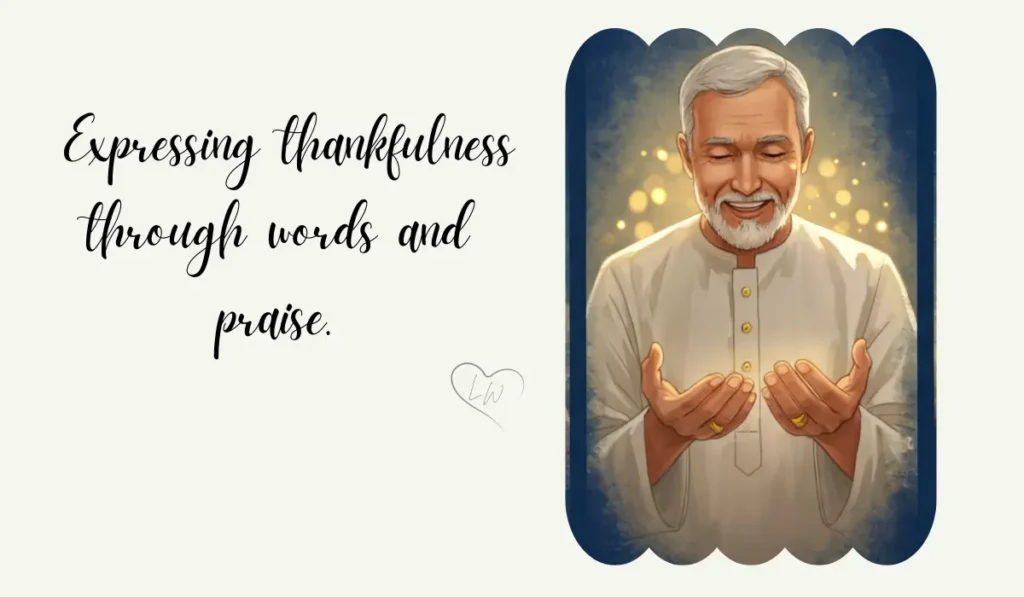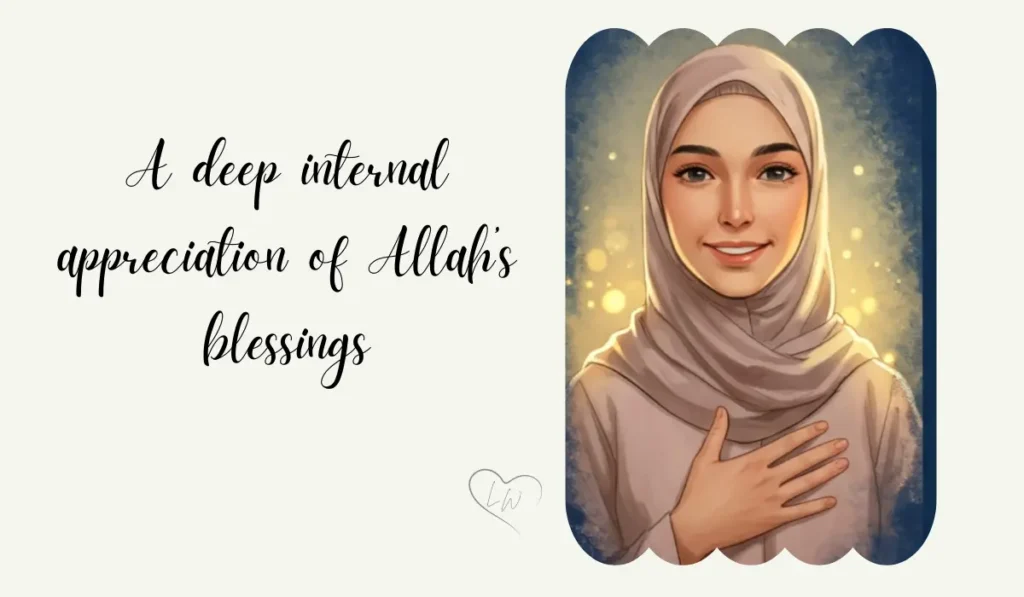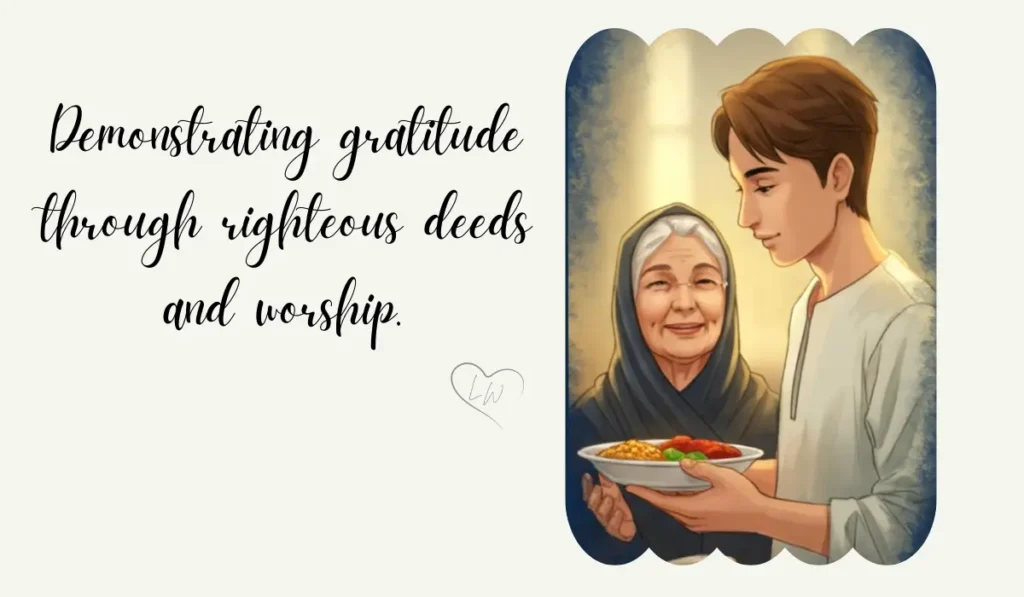Islamic gratitude holds a significant place in a believer’s life, reflecting appreciation of Allah’s mercy. It extends beyond material blessings, encompassing every gift—both seen and unseen—that Allah bestows upon us. This article explores Islamic gratitude, highlighting Quranic verses, Hadiths, and practical ways to cultivate a thankful heart.

1. The Meaning of Islamic Gratitude
In Islam, gratitude (Shukr) is more than a verbal expression—it is a way of life and a fundamental act of worship. It strengthens the bond between a believer and Allah, ensuring that Islamic gratitude is practiced in every moment, not just in times of ease. Islamic gratitude is also divided into three key aspects:
- Gratitude of the Heart (Shukr bil Qalb) – A deep internal appreciation of Allah’s blessings.
- Gratitude of the Tongue (Shukr bil Lisan) – Expressing thankfulness through words and praise.
- Gratitude of Action (Shukr bil Jawarih) – Demonstrating gratitude through righteous deeds and worship.
Quranic Verses on Islamic Gratitude
The Quran frequently emphasizes Islamic gratitude, illustrating its role in attracting Allah’s continued blessings:
“If you are grateful, I will surely increase My favor upon you.” – (Quran 14:7)
This verse highlights that Islamic gratitude is a key to abundance and divine mercy. Being thankful not only brings contentment but also invites more blessings into our lives.

“Indeed, Allah is with those who are patient and grateful.” – (Quran 3:146)
Here, gratitude is linked with patience, showing that true faith lies in maintaining Islamic gratitude even during hardships.
Hadiths on Islamic Gratitude
The Prophet Muhammad (PBUH) emphasized both spiritual and interpersonal gratitude:
“He who does not thank people does not thank Allah.” – (Prophet Muhammad, PBUH)
This Hadith teaches that expressing Islamic gratitude to others is an extension of our gratitude to Allah.
“Whoever is not grateful for small blessings will not be grateful for large ones.” – (Prophet Muhammad, PBUH)
A reminder to appreciate even the smallest gifts—good health, a kind word, or a meal—all of which are signs of Islamic gratitude.
2. The Spiritual Significance of Islamic Gratitude
Islamic Gratitude Leads to Inner Peace
Gratefulness strengthens our connection with Allah, leading to inner peace, humility, and contentment. Recognizing that all blessings come from Allah fosters a sense of tranquility and reliance on Him.
“And if you are grateful, He is pleased with you.” – (Quran 39:7)
This verse reassures believers that Islamic gratitude pleases Allah, bringing us closer to Him.
Islamic Gratitude Prevents Arrogance
Ingratitude can lead to pride and self-reliance, making a person forget their dependence on Allah.
“Do not turn your face away from people in pride, nor walk in insolence through the earth; verily, Allah does not like any arrogant or boastful person.” – (Quran 31:18)
By practicing Islamic gratitude, we remain humble and aware of our reliance on Allah’s mercy.
Islamic Gratitude Strengthens Faith
A believer who consistently practices Islamic gratitude develops a stronger connection with their Creator. The ability to see both hardships and blessings as part of Allah’s divine wisdom strengthens reliance on Him.
“And whatever blessing you have, it is from Allah.” – (Quran 16:53)
This verse reminds us that every favor, no matter how small, is a gift from Allah that should be acknowledged through Islamic gratitude.
3. Practical Ways to Cultivate Islamic Gratitude
Reflect on Your Blessings
One of the best ways to nurture Islamic gratitude is through daily reflection:
“And He it is Who created you and made for you hearing, sight, and hearts. Little is it that you give thanks.” – (Quran 23:78)
This verse encourages us to appreciate fundamental blessings such as vision, hearing, and intellect.

Express Islamic Gratitude in Prayer
Salah (prayer) is a powerful way to express Islamic gratitude. Each prayer serves as a reminder of Allah’s mercy and provides an opportunity to give thanks.
“Indeed, with every difficulty, there is relief.” – (Quran 94:6)
Even in challenges, Islamic gratitude builds resilience and strengthens faith.
Show Islamic Gratitude to Others
Being thankful extends to how we treat others. Islam encourages us to express Islamic gratitude towards family, friends, and even strangers.
“And lower to them the wing of humility out of mercy and say, ‘My Lord, have mercy upon them as they brought me up [when I was] small.'” – (Quran 17:24)
This verse emphasizes thanking our parents and treating them with kindness as a form of Islamic gratitude.
Keep a Gratitude Journal
A gratitude journal helps believers focus on Allah’s blessings. Writing down three things to be grateful for each day can shift focus from negative thoughts to positive appreciation, reinforcing Islamic gratitude.
Charity as a Form of Islamic Gratitude
One of the most powerful ways to show Islamic gratitude is by sharing blessings with others. Giving charity (Sadaqah) is an act of appreciation for Allah’s provisions.
“And spend of that which We have provided you before death approaches one of you.” – (Quran 63:10)
Charity strengthens Islamic gratitude by reminding believers that wealth and resources are entrusted by Allah and should be used to help others.
4. Islamic Gratitude in Difficult Times
Islam teaches that even hardships contain hidden blessings. When faced with trials, a believer should remain patient and trust in Allah’s wisdom.
“O you who have believed, seek help through patience and prayer. Indeed, Allah is with the patient.” – (Quran 2:153)
Every challenge is an opportunity for growth, and practicing Islamic gratitude during hardships strengthens faith and resilience.
Trusting in Allah’s Wisdom
Sometimes, blessings are disguised in difficulties. What appears to be a hardship may carry hidden wisdom that benefits us in ways we cannot immediately see.
“Perhaps you dislike a thing and it is good for you, and perhaps you love a thing and it is bad for you. And Allah knows while you know not.” – (Quran 2:216)
This verse reminds believers that Allah’s wisdom surpasses human understanding, and even difficult experiences may bring long-term benefits through Islamic gratitude.
5. Conclusion
Islamic gratitude is a mindset, an act of worship, and a pathway to contentment. Through reflecting on blessings, engaging in prayer, and showing appreciation to others, believers strengthen their connection with Allah.
By integrating Islamic gratitude into daily life—whether through prayer, reflection, charity, or kind words—one can develop a heart full of thankfulness and peace.
Whether in moments of joy or hardship, maintaining a grateful heart opens the doors to mercy, peace, and spiritual fulfillment.
Reflection:
How do you incorporate Islamic gratitude into your daily life? Share your thoughts in the comments below.

